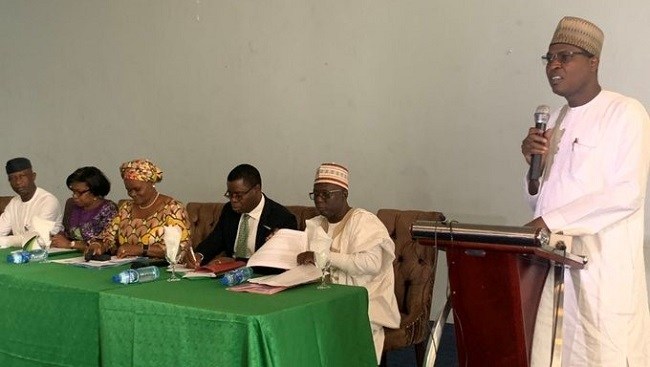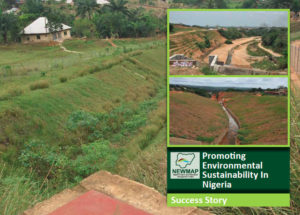The Federal Ministry of Environment has charged Ministry, Department and Agencies (MDAs) to identify projects that could be funded by Green Bond (GB) to mitigate negative effects of climate change in Nigeria.
Dr Peter Tarfa, Director, Department of Climate Change, Federal Ministry of Environment, gives welcome remarks as dignitaries like Mrs Ibukun Odusote, Permanent Secretary of the ministry; Dr Amos Abu of the World Bank; Mrs Patience Oniha, Director General, Debt Management Office (DMO); Prof Shola Adepoju, Director, Forestry Research Institute of Nigeria (FRIN); and Salisu Dahiru, National Project Coordinator, Nigeria Erosion and Watershed Management Project (NEWMAP), look on.
Mrs Ibukun Odusote, Permanent Secretary in the ministry, gave the charge during an Inter-Ministerial Committee on Climate Change meeting on selection of GB 2019 project pipelines on Friday, July 26, 2019 in Abuja.
The Green Bond is a bond specifically earmarked to be used for climate and environmental projects. The bonds are typically assets linked and backed by the issuer’s balance sheet; and can also be referred to as climate bond.
The ministry and other MDAs met to deliberate on issuance of the third green bond and critical projects that will be funded by the bond.
The first and second green bonds since inception are said to have made remarkable impact in efforts to reduce greenhouse gas (GHG) emission to meet the global emission reduction commitments.
Nigeria, being the first in Africa to issue a sovereign green bond in December 2017, has fostered the country’s efforts to curb the negative effect associated with climate change, she disclosed.
Odusote said that projects that would be funded with the green bond would be visible and have impact on the lives of Nigerians.
“The green bond is to fund clean projects that Nigerians can feel the impact that; is the purpose of our meeting here today.’’
She said that the first and second green bonds issuance were over-subscribed, adding that several projects in the Forestry Department were funded by the bonds in which numerous communities were positively affected.
Dr Rachid Benmessaoud, the Country Representative, World Bank, said that the bank would continue to support Nigeria’s climate change actions including the Nationally Determined Contributions (NDCs).
Benmessaoud, represented by Dr Amos Abu, Senior Environmental Specialist, World Bank, said that the bank would continue to support the issuance and management of the sovereign green bond.
He urged stakeholders at the meeting to draw from lessons learnt from the previous of the two green bonds in preparation for the third one.
“One of the lessons learnt from the previous two green bonds is starting early; we need to start early and make it participatory and collaborative,’’ he said.
He urged stakeholders involved in the preparation of the third green bond to ensure transparency of the process to investors that would be committing their funds in the project.
Mrs Patience Oniha, Director General, Debt Management Office (DMO), said that her office was responsible for borrowing of external or domestic sovereign.
Oniha urged stakeholders at the event to focus more on utilizing the natural resources of the country such as the sun, wind, forest and desert available, adding that Nigeria has a wide range of opportunities of sustainable financing.
Dr Peter Tafa, the Director, Climate Change Department of the ministry, called all MDAs interested in participating in the third green bond issuance to avail the ministry of various projects they have.
Tarfa commended the World Bank, DMO and other relevant stakeholders for assisting Nigeria to understand the need to transit to a low carbon economy.
Credit-Environewsnigeria.com


